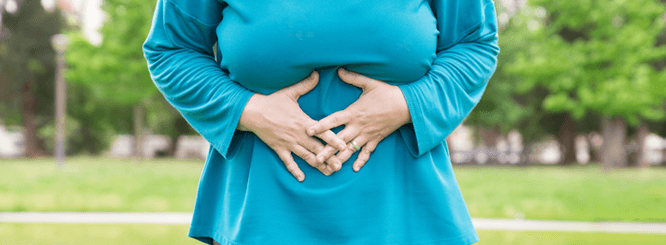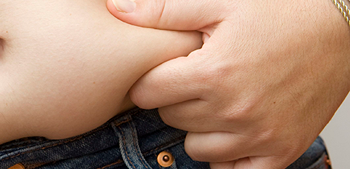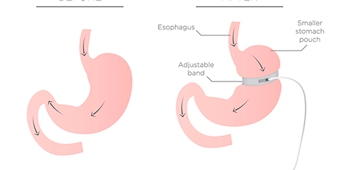
So, you just underwent gastric sleeve surgery? You made the right call. A gastric sleeve surgery is a safe and efficient treatment for obesity and its associated comorbidities like type II diabetes, hypertension, hyperlipidemia, heart disease, strokes, obstructive sleep apnea, gallbladder disease, joint pain, and so much more. According to the International Federation for the Surgery of Obesity and Metabolic Disorders’ (IFSO) latest report, the gastric sleeve surgery is the most requested and most practiced bariatric surgery worldwide [1]. Being a fairly standardized procedure for which many clinical studies and data is available, rest assured that the gastric sleeve surgery is truly one of the safest bariatric surgeries out there.
Experiencing abdominal pain is a common and regular complaint after any type of bariatric surgery. In most cases, the abdominal pain will tend to decrease with every passing day and it is nothing to worry about. But in few other cases, where patients feel acute abdominal pain that instead of ameliorating it seems to increase and worsen with every passing hour or day, it might represent the symptom of a post-surgical complication.
We will guide you through the different types of complications that are usually linked to acute abdominal plain after a gastric sleeve surgery. As you read the next following paragraphs, please consider that acute and increasing abdominal pain after any bariatric surgery is a sign of concern that should not pass unacknowledged and that you should call your surgeon immediately if you experience acute abdominal pain along with any other symptom like fever, tachycardia or difficult breathing.
Normal vs abnormal abdominal pain after surgery:
Abdominal pain after gastric sleeve surgery could manifest due to the normal recovery of the body after surgery, as it received stitches and it is still adapting to major changes. This type of pain can be fully controlled with prescribed pain medication and it tends to ameliorate during the first few days after surgery. This type of pain is no reason for concern.
However, when the abdominal pain tends to increase after surgery or it manifests weeks or months after surgery, then it could be a sign of a post-surgical complication that should be diagnosed and treated as soon as possible. Some of the complications might be due to general surgical causes; but others could be due to the specific risks of gastric sleeve surgery.
Abdominal pain as a symptom of general surgical complications:
General post-surgical complications in bariatric patients which manifest through abdominal pain are [2]:
- Surgical Site Infection. Most surgical site infections occur within 2 to 3 weeks following surgery. The rate of surgical site infections after laparoscopic bariatric surgeries is very low, at 4% [3]. These are infections occurring within 30 days after a surgical operation that affects either the incision or tissue deep into the operation site [3].
- Cholelithiasis (a.k.a. Gallbladder disease). This complication involves the formation of hardened deposits of digestive fluid in the gallbladder [4]. Gallbladder disease is common after bariatric surgery, mostly because of the rapid weight loss process; its incidence ranges from 30% to 53% in bariatric patients, but only a minority (7%-15%) require cholecystectomy [2].
- Small Bowel Obstruction. These are more commonly seen months after surgery and may be caused by hernias or adhesions. It consists in the blockage of the small intestine and it manifests along with bloating, vomiting, general discomfort and obstipation. Partial obstructions may be treated with bowel rests, IV fluids, and repletion of electrolytes; while complete obstructions are usually dealt with therapeutic laparoscopy [2].
- Post-operative bleeding. Any surgery carries the risk of bleeding. But gastric sleeve surgery, particularly, implies the stapling of the stomach, which may cause internal bleeding within the first 24 hours previous to surgery. During this time the patient is under observation in his recovery room, so doctors are very vigilant of its symptoms, which includes dizziness, shortness of breath, tachycardia, a pale appearance and minimal urination.
Abdominal pain as a symptom of specific gastric sleeve complications:
Gastric Sleeve Surgery specific complications that manifest through abdominal pain are [2]:
- Gastrointestinal leak. This is the most serious type of complication that can arise after a bariatric surgery, and it is “a leak of luminal contents from a surgical join between two hollow viscera” [5]. Its incidence ranges from 0% to 7% in gastric sleeve surgeries [2], but it carries a significant risk of morbidity and mortality. This is the reason why its early detection and diagnosis is highly important. Although some patients remain asymptomatic, the most common symptoms of a gastrointestinal leak are, of course, abdominal pain, but also chest pain, shoulder pain, tachycardia, high fever, and respiratory distress. If you received a bariatric surgery and are suffering any of these symptoms, call your doctor immediately.
- Gastric Stenosis. This is a very uncommon condition (ranging from 0.1% to 3.9%) where the twisting of the gastric tube obstructs or delays gastric emptying. Its treatment will depend on the severity of the stenosis. Its symptoms are similar to those in the gastroesophageal reflux disease.
- Gastroesophageal Reflux Disease (GERD). Patients suffering from reflux disease after gastric sleeve surgery experience regurgitation and dyspepsia. It is a very common digestive disorder where acid juices from the stomach go from the stomach back to the esophagus and it is also associated with abdominal pain. This type of complication can usually be treated with lifestyle and nutritional modifications.
Contact our clinic today
At LIMARP International Center of Excellence for Obesity, located at Tijuana, Mexico, we take your health very seriously. After your gastric sleeve surgery, we supervise and monitor the evolution of your recovery at our private hospital rooms and we make sure you progress safely into your new, more healthy life. If you have any doubts or questions about abdominal pain after gastric sleeve surgery or are experiencing any suspicious symptom after your treatment, please call us immediately. We will intervene and guide you through everything you need to know.
At our clinic we offer different non-surgical and surgical treatments for obesity in an integral bariatric program with a multidisciplinary approach. At LIMARP your medical intervention for obesity includes psychological and nutritional counselling, as well as the guidance of a fitness expert. We also offer all-inclusive packages for patients travelling from abroad, where we include lodging at our clinic’s luxurious next-door hotel, and transportation from the airport to the hotel and back.
If you’re interested in getting to know more about our clinic and services, or if you’re interested in knowing if a gastric sleeve surgery is the right choice for you, please call our phone number (619) 270 8823 or send us a message through this website or any of our social media pages. Our team of experts will be glad to help.
Bibliography
- [1]International Federation for the Surgery of Obesity and Metabolic Disorders (IFSO) (2019). Fifth IFSO Global Registry Report 2019. https://www.ifso.com/pdf/5th-ifso-global-registry-report-september-2019.pdf
- [2]Lewis, K. D.; Takenaka, K. T. & Luber, S. D. (2016). Acute Abdominal Pain in the Bariatric Surgery Patient. Emergency Medicine Clinics of North America, 34: 387-407. https://pubmed.ncbi.nlm.nih.gov/27133251/
- [3] Chopra, T.; Zhao, J. J.; Alangaden, G.; Wood, M. H.; Kaye, K. S. (2010). Preventing surgical site infections after bariatric surgery: value of perioperative antibiotic regimens. Expert Review of Pharmacoeconomics & Outcomes Research, 10(3): 317-328. https://www.ncbi.nlm.nih.gov/pmc/articles/PMC2904239/#R20
- [4] Tanaja, J.; Lopez, R. A.; Meer, J. M. (2020). Cholelithiasis. StatPearls. https://www.ncbi.nlm.nih.gov/books/NBK470440/
- [5] Burgos, A. M.; Braghetto, I.; Csendes, A.; Maluenda, F.; Korn, O.; Yarmuch, J.; Gutierrez, L. (2009). Gastric Leak After Laparoscopic-Sleeve Gastrectomy for Obesity. Obesity Surgery, 19: 1672-1677. https://pubmed.ncbi.nlm.nih.gov/19506979/


